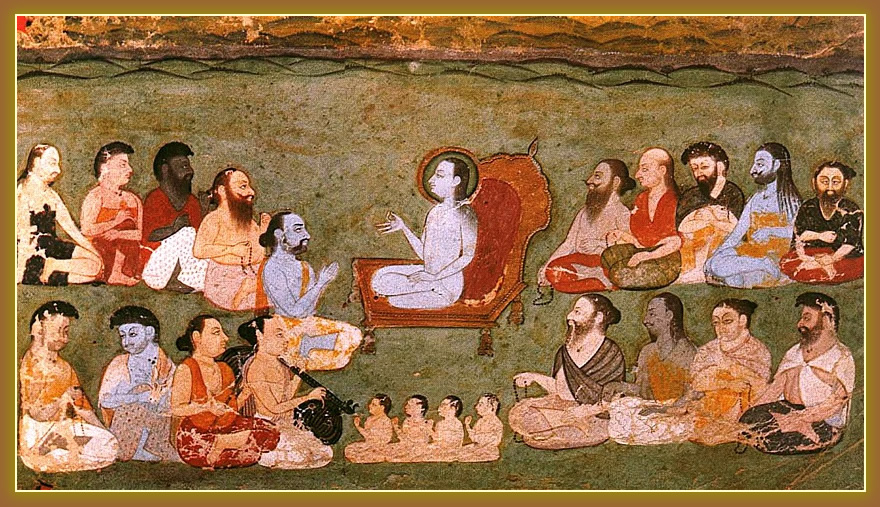
(7) When it thus is not a question of being
material oh brahmin, can you from your self-knowledge, tell me whether
the living being in this undertaking accidentally arrives
at a body or because of some cause? (8)
If He is in the possession of the lotusflower of this world that as it
were
sprouted from His abdomen, then what is the difference between the
Original Person to the measure of this extent [of the Virâth
Rûpa] and the situation one speaks of with the different
embodiments [of the living entities]? (9) How could he on the lotus flower who was not
born from matter himself but from the navel, he [Brahmâ] who gave life to all the ones
born with a material body, through His mercy see His Form? (10) And also [how can it be that] He as the
Original Person maintaining, creating and annihilating the material
worlds, remains untouched by His own external energy while He as the
Lord of all energies rests in the heart of everyone? (11) Formerly
I
heard
you
discuss
[in
chapter
2.5] the
different [planets or] worlds with their governors as the different
parts of the body of the Original Person. So what [can you tell us]
about those governors who by their different places are the different
parts of Him?
(12) And what about a day of Brahmâ [a kalpa]
and
the
periods
between
them
[vikalpas]? What can you say about
the time measures we call the past, the future and the present? And how
about the lifespan allotted to embodied beings? (13) Oh purest of the twice-born ones, what could
be
the beginning of time and what can you say about the way time, in the
context of one's karma, is experienced as being short or long? (14) And also to what
extent is one ruled by one's accruing karma in relation to the
different modes of nature and the different life forms resulting from
it as a consequence of one's desire? (15) Please describe to us how the creation of
the lower regions, the four quarters of heaven, the sky, the planets
and the stars, the hills, rivers, the seas and the islands and their
inhabitants took place. (16)
What is the extent and measure of [the] outer space [universe] and the
inner space, and what are their divisions? And what is the character
and action of the great souls and the vocations and age groups of
society? (17) What
are the different ages, how long do they take and what is their nature?
And which incarnation of the Lord performs what kind of wonderful
activities in each and every age?
(18) What are the different religious duties of
human
society at large and what are the duties of the three classes [labor,
trade and
intellect] and their administration [the fourth class]? And what would
the obligations be towards people in distress? (19) How many
elements are there in creation, what are their
characteristics and how do they react? What are the rules and regulations of
the devotional service to de Original Person in the culture of yoga
and what are the different spiritual methods that lead thereto? (20)
What are the powers the yoga master acquires, where do they lead to,
how do
the yogis detach from the astral body and what is the transcendental
knowledge found in the Vedas, their
subsidiary
literatures
[the Upaveda],
the law books and
the Vedic stories and historical accounts? (21) How do the different ways of the
living beings come about and how do they find their end? What are the
procedures for performing rituals, pious works and deeds of
self-interest
and what are the regulations for the three goals of life [the economic,
religious and sensual interests]?
(22) How
do all those
who either live in union with the Lord or go against Him find their
existence and
to what extent are those who are liberated conditioned relative to the
ones who lead a life less determined? (23)
How does the independent Supreme
Lord
enjoy His pastimes from His own inner potency and how can He forsake
them when He as the
Almighty One remains a
witness to the external of His
capacity?
(24) About all this and more that I did not ask you
oh fortunate one, I have
been wondering from the beginning. Please explain in accordance with
the truth oh great sage, that what you want to tell me with us all
having
fallen at your feet. (25) Surely in
these matters of factual knowing you are as good as Brahmâ
who originated directly from the Lord, while others who following the
customs accordingly may only speak from borrowed knowledge. (26) I never tire oh brahmin, of drinking, in the
hunger of my fasting, from the nectar of the infallible truth thar
flows
from
the ocean of what you say.' "
(27) Sûta Gosvâmî said: "He [S'ukadeva] thus in that assembly
being questioned
by the king on topics concerning the highest truth like these, was, as
the
instrument of the Creator, very pleased with this servant of
Vishnu. (28) He instructed this Purâna called the Bhâgavatam the way it was transmitted by the Supreme Lord to Lord Brahmâ at the beginning of the
first day [or kalpa] of creation. (29) This was the first thing he [in 2.1: 8] said in
preparation of a full description from the beginning to the end of
everything that the king, the best of the Pându dynasty, had
asked and
would ask more."

